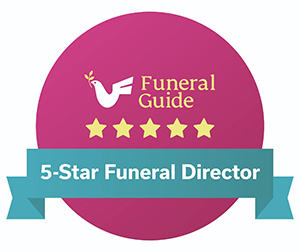If you’re helping someone through grief, understand that death is always hardest on those left behind.
When someone experiences the death of a loved one, they still have to get up and function in some way or other. Day in day out.
There might be young children who rely on a grieving person for strength, when that same person is struggling themselves. Somehow that person needs to find direction in a world that’s been turned upside down.
During such a difficult time, they will need those closest to them for support.
But if you are that close friend or family member, what can you do to help a person who is grieving?
It’s tricky knowing what to say, what not to say, not overthinking or being oversensitive.
Family and Friends – Helping Someone Through Grief
It’s always worth remembering that just being there is hugely important. You don’t have to make grand gestures, just make yourself available:
-
Just Be There
People grieve in their own way and in their own time. You aren’t expected to have the answers and nor should you. If the bereaved person feels up to talking, listen with patience and understanding, especially if you’ve already heard it before.
Don’t worry about trying to find solutions or trying to ‘make it better’. It takes time, and only the grieving person holds that particular clock. Let them know you are there, when they are ready. Make it so they can reach out when they need to.
Contact them regularly. Quick phone calls can make the world of difference to someone who is grieving. Also encourage other people to do the same.
-
Don’t Ignore the Death
It can feel like the right thing to do to act like nothing has changed. But if you’re supporting a grieving friend you should acknowledge that the death happened. It will help them come to terms with their grief and loss in a much healthier way and in a way that helps them move forward.
And always refer to the person who died by name. It’s all part of effectively supporting a grieving person.
-
The Practical Stuff
When it comes to helping people who are grieving it’s the everyday practical things that can really help too. You can offer to help around the house, perhaps go shopping and cook a meal. Chores can quickly become mountains in a person’s mind if they feel like they can’t tackle them. But as a supportive friend you can really help here if it’s needed.
Some bereaved people might find comfort in trying to maintain a routine, others might really welcome the help.
In some cases however, those who are grieving can find it hard to accept help. Again, where you can fit in comes down to your patience and understanding.
Mental Health – Helping Someone Through Grief
At some point, part of your role of offering support might be to show the bereaved that they do have the chance to enjoy life again. Experiencing joyful moments is part of healing and in no way lessens the importance of the deceased. Neither should that person feel guilty.
When they’re ready take them out and show them that life does offer other opportunities to be happy. It could be something as simple as going for a coffee.
You may also find yourself in a position where your friend isn’t coming to terms with their grief and needs the help of a mental health professional. It’s a difficult area to approach, but you could suggest they visit their doctor or contact local support groups who are experienced in bereavement issues and can offer a bereaved friend or family member another perspective. The NHS website also has information about dealing with grief.
As part of our ongoing commitment to you, we also offer a complimentary bereavement support service. We have dedicated facilities based at our Leigh on Sea office where people can talk in a comfortable and confidential setting. It’s a place to talk freely and honestly to gain a better understanding of any thoughts and feelings following the death of your loved one.
Things to Avoid When Helping Someone Through Grief
- It’s crucial to let the bereaved work through the grief in their own way and part of moving forward is for them to not feel any pressure to do things a certain way.
- Just being there to listen really helps. Resist any urge to be constantly talking. Listening is a greater benefit in these circumstances.
- If a story involves the deceased, don’t be afraid to tell or be involved in that story.
- Don’t attempt to distract the mourner with general news as it can often make them feel like their grief isn’t as important.
- Don’t compare your life experiences or problems to theirs. And don’t give them a timeline for when they’ll feel better. Overcoming grief is a personal timeline.
- It may be well-meaning, but don’t use cliches and empty phrases like: ‘They’re not in pain anymore,’ or ‘Time’s a great healer’. The pressure to say the right thing can cause well-meaning people to say some hugely inappropriate things.
- Your religious and spiritual beliefs are yours alone. Don’t bring them into the situation if the deceased does not share them.
Beating Grief in Isolation
Current circumstances with lockdowns and self-isolation can make bereavement even harder. Someone who is grieving might normally reach out to close friends but thanks to the restrictions can instead feel that they are totally alone.
If you aren’t in their support bubble you can still contact someone using Facetime or Zoom. Don’t underestimate the effect a call or other contact will have, even if it’s done virtually. And as of writing this you can meet one person from another household in an outdoor environment, such as a park or the beach.
Charities such as The Good Grief Trust have swapped their face to face pop-up cafes for virtual ones on Zoom. These can be an important chance for people to meet with other bereaved people in their local area.
Final Thoughts
You may have known the deceased too, even if it was not as closely as the friend or family member you are trying to support. While you are feeling sad, someone else might be feeling angry. It’s natural to deal with death in your own way.
It can take years to overcome the death of a loved one. And that change will likely come in lots of small steps not a few giant leaps. The best way you can help in supporting a grieving person is to be there when they need you.
S. Stibbards & Sons Ltd
Our close connection with families has allowed us to build and run one of the most well-respected funeral directors in the Southend area.
If you have recently lost a loved one and need help with any arrangements, then please get in touch with our understanding and compassionate team today.







